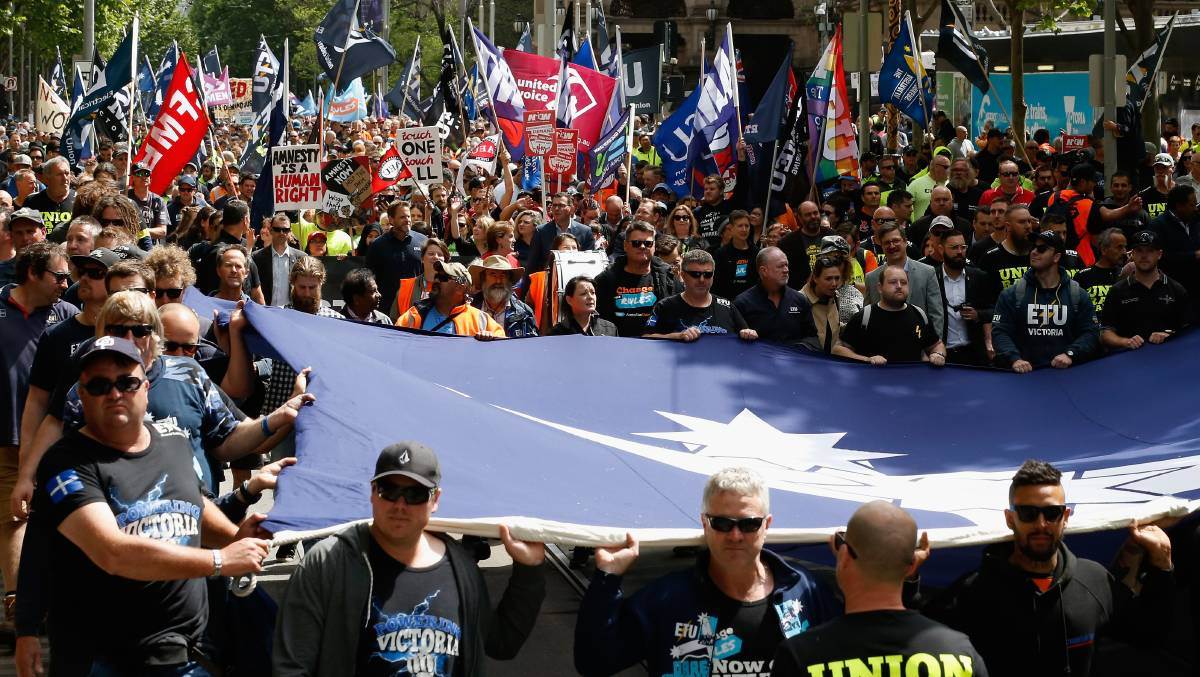Recently at the National Press Club, ACTU Secretary Sally McManus reminded us of the genesis of hardline neoliberalism in Australia and the trail of community destruction it left in its wake: “This hyper-aggression towards and demonising of unions had its genesis in 1983. In that year, Gerard Henderson, a soon to be staffer to John Howard, wrote an article attacking the system of co-operation between employers and unions.
“This call was taken up a few years later and became a campaign proper with a meeting organised by four men in Toorak in February 1986 – a meeting which led to the creation of the HR Nicholls Society. Those four men were John Stone, Peter Costello, Barrie Purvis and Ray Evans.”
This timely reminder of the history we need to learn from, rather than repeat, led Canberra Times regular columnist Nic Stuart to ask McManus whether “… the four men meeting in Toorak starting the HR Nicholls Society have actually won?”
What happened next is worth recalling. McManus: “You’ve got to look at what winning looks like…. What it looks like is people can’t pay the bills now. What it looks like is for the first time… we’re handing on a worse standard of living to our kids. We are dramatically going backwards in terms of real wages…. people… can’t get a fair pay increase, even though, especially over the last two years, Australians worked their guts out… So many workers are completely exhausted…. It’s workers that are going backwards while profits are going up, CEO pay is going up… so, yes they [the founders of the right wing HR Nicholls Society and their ilk] have got what they wanted and what they wanted is not good for the country.”
Neoliberal capitalism has had its day. If its prize-fighters are now scrambling to find and present a human face, they are wasting their time. It already has a human face. It is the face of the worker who, despite being in paid work, cannot afford a place to live for herself and her children. It is the face of the worker who is unable to find a job and is therefore waging a daily battle from below the poverty line, with no immediate prospect of a JobSeeker increase. It is the face of the worker who is told they should be grateful because they have a relatively steady job but who, in the words of Tasmanian CEPU organiser Chris Clarke, “every time [they] ask for a fair share they get told there isn’t enough.” The champions of neoliberal capitalism can stop scrambling to find a human face for their tired and tortuous ideology. It already has a human face, Janus-like though it may be. It is, on the one side, the face of human suffering, and on the other, the face of human greed.
Wage suppression is not accidental. Any more than the suppression of income support payments or the deliberate precarisation of work, making it so tenuous and fragmented that it is no longer a guaranteed route out of poverty. Rising prices, rising profits, declining wages (both in relation to the cost of living and as a proportion of national income) and inadequate social infrastructure, are all of a piece, all cut from the same heavy neoliberal cloth. A shambolic ensemble. And we’re meant to wear it!
At the heart of the neoliberal project though is what the four blokes in Toorak sought to orchestrate with extreme prejudice, namely the atomisation, the fragmentation, the dis-organisation of the working class. This was never just a political battle, never just an economic battle. It was always a cultural battle as well, a thirty year war against the collective soul of working people, a war against the very notion of community. It was an ideological offensive against the simple practice of people standing in the shit together, and sticking up for each other. It was meant to turn us against each other. This was what lay at the heart of that “hyper-aggression towards and demonising of unions.” It was therefore unsurprising to see a campaign against unions also morph into a campaign against civil society, a campaign against women, against First Nations peoples, against refugees, against people with a disability, against sole parents, against unemployed workers, against students, against queer people… It was a campaign against people looking out for each other and looking for what common ground we have with each other, which is why, for instance, the neolibs are screaming blue murder over the common ground that unions and small business are discovering and tending with such mutual respect and good will. It was an assault on the practice of solidarity, an attack on the tenderness of the people.
Why? Because those who put power before social purpose can get away with virtually anything when they successfully divide us and turn us against each other. Solidarity, and the unity it begets, is the greatest threat to the neoliberal agenda of unfettered profiteering coupled with unconscionable privation and deliberate disempowerment.
Neoliberalism was never faceless. But it was always heartless. Did its proponents get what they wanted? Mostly. But they didn’t get everything. They did everything they could to shackle, weaken and destroy the union movement and other progressive sections of civil society. They inflicted untold damage and there is much that must be urgently undone. But they have not destroyed us and so on this front they did not win. And they won’t win. Not as long as we recognise that an attack on the quality of life of any of us is in the long run an attack on all of us.
Dr John Falzon
The Canberra Times, 13/10/22

